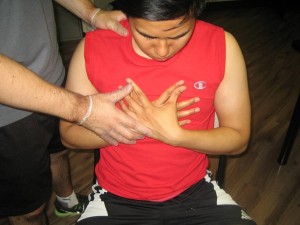An enlarged heart is medically called as cardiomyopathy in which the heart muscles gradually weaken. The symptoms of cardiomyopathy typically include difficulty breathing, leg swelling, dizziness and fatigue. Lightheadedness and fainting are other symptoms that can occur. If an enlarged heart is left untreated, it increases the risk for the development of certain complications.
Heart murmurs
A heart murmur is basically an abnormal heart sound that manifests once the heart is beating. It is important to note that the heart can have a whooshing sound. Oftentimes, heart murmurs can occur at birth or develop due to an underlying health issue.
The symptoms of a heart murmur usually include shortness of breath, bluish skin around the nails and fingernails, enlarged liver, swelling and chest pain. The other symptoms of a heart murmur include heavy sweating, dizziness, fainting, poor appetite and weight gain. The innocent or harmless murmurs can develop due to fever, exercise, anemia and an overly active thyroid gland. Oftentimes, a hole in the heart or issues with the valves in the heart can lead to a heart murmur.

Medications such as anticoagulants, digoxin, diuretics and cholesterol-lowering drugs can be utilized to manage the heart murmurs. Oftentimes, surgery can be carried out to close a hole in the heart or repair the malfunctioning valves.
Heart failure
Cardiomyopathy is a condition in which the muscles of the heart becomes stiff or thickened, thus it could no longer pump effectively which leads to heart failure. The symptoms of heart failure include shortness of breath, dizziness, cough and an irregular heartbeat. Always bear in mind that heart failure can lead to other symptoms such as weakness, fatigue, pounding heartbeat and chest pain.
The treatment for heart failure is to maintain the blood pressure at a normal level, regular exercise and avoiding alcohol. The other symptoms of heart failure include normalizing the level of cholesterol and managing diabetes. Medications such as digoxin, diuretics, anticoagulants, ACE inhibitors or beta-blockers are used to manage heart failure. In some cases, surgery or a pacemaker can help manage the condition.
Cardiac arrest
An enlarged heart can lead to cardiac arrest. It is important to note that cardiac arrest is a condition in which the heart abruptly loses function. The indications of cardiac arrest include low blood pressure, loss of consciousness and sluggish pulse.
The usual cause of cardiac arrest is coronary artery disease which is a condition in which the vessels in the heart become clogged up. Oftentimes, an irregular heart rhythm due to an enlarged heart can lead to cardiac arrest as well. In most cases, an electric shock or defibrillation is administered to reverse the cardiac arrest. You can enroll in a course on CPR today to properly perform the appropriate measures.
